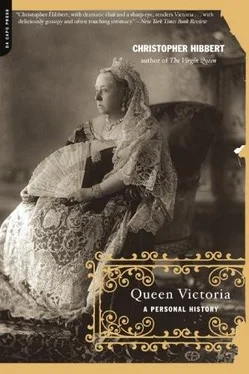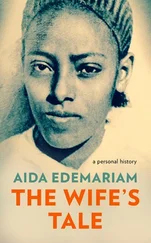Christopher Hibbert - QUEEN VICTORIA A Personal History
Здесь есть возможность читать онлайн «Christopher Hibbert - QUEEN VICTORIA A Personal History» — ознакомительный отрывок электронной книги совершенно бесплатно, а после прочтения отрывка купить полную версию. В некоторых случаях можно слушать аудио, скачать через торрент в формате fb2 и присутствует краткое содержание. Жанр: Биографии и Мемуары, на английском языке. Описание произведения, (предисловие) а так же отзывы посетителей доступны на портале библиотеки ЛибКат.
- Название:QUEEN VICTORIA A Personal History
- Автор:
- Жанр:
- Год:неизвестен
- ISBN:нет данных
- Рейтинг книги:5 / 5. Голосов: 1
-
Избранное:Добавить в избранное
- Отзывы:
-
Ваша оценка:
- 100
- 1
- 2
- 3
- 4
- 5
QUEEN VICTORIA A Personal History: краткое содержание, описание и аннотация
Предлагаем к чтению аннотацию, описание, краткое содержание или предисловие (зависит от того, что написал сам автор книги «QUEEN VICTORIA A Personal History»). Если вы не нашли необходимую информацию о книге — напишите в комментариях, мы постараемся отыскать её.
QUEEN VICTORIA A Personal History — читать онлайн ознакомительный отрывок
Ниже представлен текст книги, разбитый по страницам. Система сохранения места последней прочитанной страницы, позволяет с удобством читать онлайн бесплатно книгу «QUEEN VICTORIA A Personal History», без необходимости каждый раз заново искать на чём Вы остановились. Поставьте закладку, и сможете в любой момент перейти на страницу, на которой закончили чтение.
Интервал:
Закладка:
Next day, while she was out walking with her mother, the King, who was driving along in his phaeton with the Duchess of Gloucester, overtook her. As his horses were brought to a halt, the King called out cheerfully, 'Pop her in!' So she was lifted up and placed between him and her aunt Mary, who held her round the waist as the horses trotted off. She was 'greatly pleased', though her mother appeared 'much frightened', fearful that her daughter would either fall out on the road or be kidnapped.
The King drove her 'round the nicest part of Virginia Water' and stopped at the Fishing Temple. Here 'there was a large barge and everyone went on board and fished, while a band played in another!' Afterwards he had his little niece conducted around his menagerie at Sandpit Gate where she inspected his wapitis, his chamois and his gazelles.
In the evenings, while staying at Cumberland Lodge, Princess Victoria was invited to watch the Tyrolese dancers creating a 'gay uproar' or listen to 'Uncle King's' band playing in the conservatory at the Royal Lodge by the light of coloured lamps. He asked her what tune she would like the band to play next. With precocious tact she immediately asked for 'God save the King!' 'Tell me,' he asked her later, 'what you enjoyed most of your visit?' 'The drive with you,' she said. He was clearly very much taken with her. 8
As the Duke of Wellington's friend, Lady Shelley, said, she paid her court extremely well. When giving the King a bunch of flowers, she said, 'As I shall not see my dear uncle on his birthday I wish to give him this nosegay now'; and when wishing him goodbye she said with appealing if rather affected gravity, 'I am coming to bid you adieu, sire, but as I know you do not like fine speeches I shall certainly not trouble you by attempting one.' 9Upon her return home she was most anxious that her mother should send 'her best love and duty to her "dear Uncle King"'. 10
Although she remembered with pleasure her days at Windsor, the Princess enjoyed her visits to her uncle Leopold's house, Claremont, even more. So much did she enjoy these visits, indeed, that she cried when it was time to go back to Kensington. She remembered being allowed to listen to the music in the hall at Claremont when there were dinner parties there and being petted by Mrs Louis, Princess Charlotte's devoted former dresser. She was petted, too, by her own nurse, Mrs Brock, 'dear Boppy', and by her mother's lady-in-waiting, Baroness Spath, who had accompanied the Duchess from Germany. Indeed, Baroness Spath, so Princess Feodora said, idolized the child and would actually go on her knees before her. 11
Very different was the behaviour of the Princess's governess, Louise Lehzen, a handsome woman, despite her pointed nose and chin, clever, emotional, humourless and suffering intermittently from a variety of complaints, mostly psychosomatic, including cramp, headaches and migraine. She claimed that she did not know what it was like to feel hungry: all 'she fancied were potatoes'; 12but she was forever chewing caraway seeds for indigestion, a habit which some maliciously attributed to a need to hide the alcohol on her breath.
In her mid-thirties at the time of her appointment, she was the youngest child of a Lutheran pastor from a village in Hanover. She was 'very strict', her former charge said of her in later years, 'and the Princess had great respect and even awe of her, but with that the greatest affection ... She knew how to amuse and play with the Princess so as to gain her warmest affections. The Princess was her only object and her only thought... She never for the 13 years she was governess to Princess Victoria, once left her.' 13
At night she stayed in the bedroom which the Princess shared with her mother until the Duchess retired; and in the morning, when the child was being dressed by Mrs Brock, she read to her so that the little girl would not get into the habit of talking indiscreetly to servants.
Yet Louise Lehzen's influence over Princess Victoria was not entirely beneficial, for the governess had her prejudices and these she implanted in her charge's mind. She encouraged the child to distrust her mother and her mother's friends and to tell people when they were wrong and 'to set them down'. 14
If Princess Victoria's early childhood was not quite as melancholy as she afterwards decided when looking back upon it, it was - and was encouraged by Lehzen to be - certainly a lonely one. She was brought up in an adult world, rarely seeing children of her own age. 'Except for occasional visits of other children,' she said herself in later life, she 'lived always alone, without companions'. She was devoted to her half-sister, Princess Feodora, but Feodora, a pretty, attractive girl, was twelve years older than herself and longing to escape from Kensington where, so she claimed, her 'only happy time was driving out' with Princess Victoria and Louise Lehzen when she could speak and look as she liked. In February 1828, when Princess Victoria was nine, Princess Feodora did escape, her only regret being her separation from her 'dearest sister' of whom she so often thought and longed to see again. [ii] She did see Princess Victoria again when she visited England in 1834. The parting after that visit was a most painful one: 'the separation was indeed dreadful,' Victoria wrote. 'I clasped her in my arms and kissed her and cried as if my heart would break, so did the dearest Sister ... I sobbed and cried most violently the whole morning ... I love no one better than her' (RA Princess Victoria's Journal, 25, 26 July 1834).
15
Having married the impoverished, 32-year-old Prince Ernest Christian Charles of Hohenlohe-Langenburg, Princess Feodora went away with him to the enormous, uncomfortable Schloss Langenburg, leaving Princess Victoria to comfort herself with her dolls (one hundred and thirty-two of them - little wooden, painted mannequins made by herself and Lehzen and dressed as historical personages and characters from the theatre and opera, all of them listed in a copybook). 16
Her mother had been lonely too. Having overcome the first shock of her husband's death, she had struck the few people with whom she came into close contact as being, in Lady Granville's words, 'very pleasing indeed', friendly and approachable.
But she herself, as she said, felt 'friendless and alone' in a country that was not her own, endeavouring to speak a language which she had not yet mastered, being, as she said with not altogether sincere self-denigration, 'just an old goose'. 17
She was well aware that, as a German, she was not well liked in the country at large and, as the widow of the Duke of Kent and mother of Princess Victoria, much resented by the Duke of Clarence, heir to the throne after the death of his elder brother, the Duke of York, in 1827. Nor did King George IV care for her.
When the Prime Minister had suggested to the King that some provision ought to be made for his sister-in-law's child, the fatherless Princess Victoria, the King declared that he would not consider it: her uncle Leopold was quite rich enough to take care of her as well as her mother. The Duchess accordingly had to borrow £6,000 from Thomas Coutts, the banker. 18Later, however, the Government came to her aid by proposing an allowance of £4,000 a year; but, since a grant of £6,000 was at the same time proposed for Princess Victoria's cousin, Prince George of Cumberland, son of the deeply distrusted and malignant Duke of Cumberland, she refused to consider the proposal. The offer to the Duchess was then raised to £6,000 and she accepted it.
At the same time, Prince Leopold assured her that he would be happy to continue the allowance he made her of £3,000 a year. She was at first reluctant to accept this; but being still heavily in debt she eventually agreed to it, even though she was finding her brother increasingly and tiresomely irritating and, as she put it, 'rather slow in the uptake and in making decisions' as well as annoyingly preoccupied.
Читать дальшеИнтервал:
Закладка:
Похожие книги на «QUEEN VICTORIA A Personal History»
Представляем Вашему вниманию похожие книги на «QUEEN VICTORIA A Personal History» списком для выбора. Мы отобрали схожую по названию и смыслу литературу в надежде предоставить читателям больше вариантов отыскать новые, интересные, ещё непрочитанные произведения.
Обсуждение, отзывы о книге «QUEEN VICTORIA A Personal History» и просто собственные мнения читателей. Оставьте ваши комментарии, напишите, что Вы думаете о произведении, его смысле или главных героях. Укажите что конкретно понравилось, а что нет, и почему Вы так считаете.











